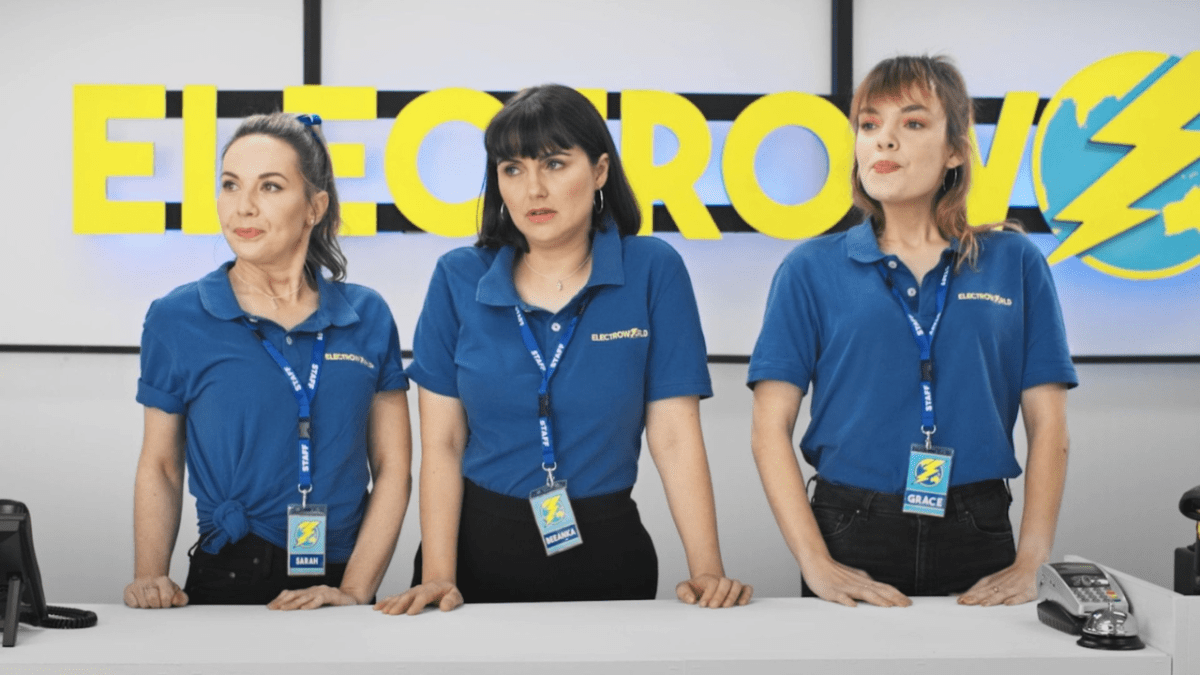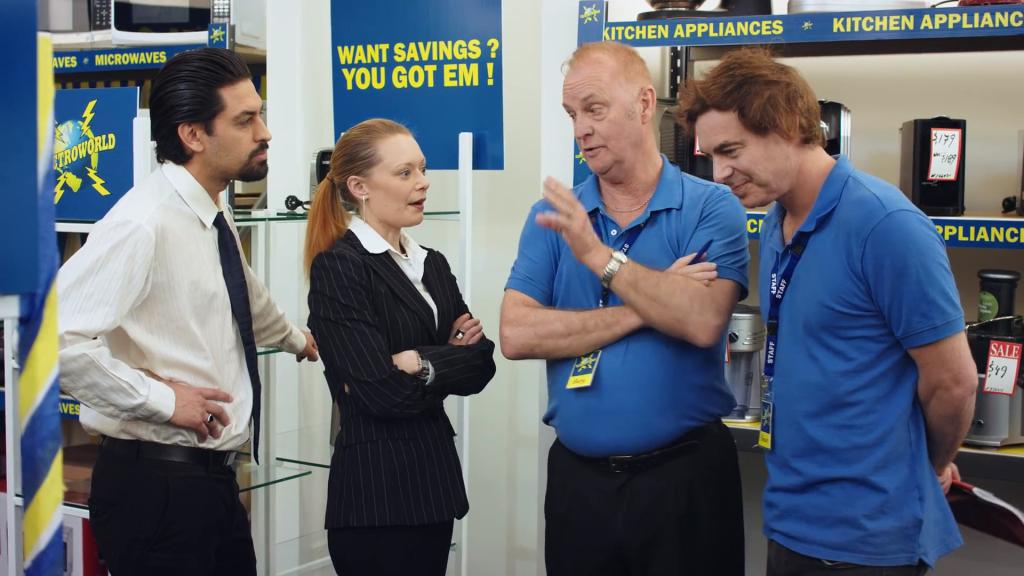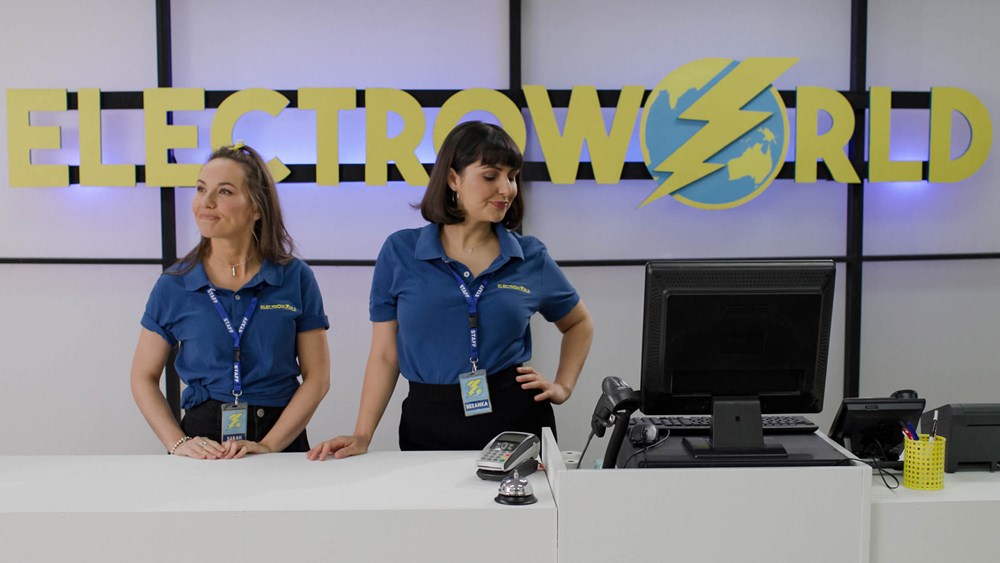
From waiting tables to stacking shelves, you’ve no doubt got a few stories from the hospo and retail jobs you’ve had over the years. My personal favourite is when a woman claimed she could “fix my face” because I had a bit of acne leftover from puberty. Ma’am, I’m just trying to give you your boiling hot cappucino, please leave me alone.
While most of our customer service job memories have been put into a ‘Do Not Open’ box, for writer and director Ryan Chamley, this retail trauma was the basis for his comedy series Rostered On.
The episodes, which are free to watch live and on demand on PEDESTRIAN TELEVISION, take place at a fictional store named Electroworld.
At the store (loosely based on JB Hi-Fi) we see what the gaggle of employees get up to and witness the struggles of working for a large corporate entity.
After the success of the first two seasons (which saw millions of views on Facebook and YouTube), the Rostered On universe expanded into season three’s Counter Girls.
This spin-off focused on fan favourites Beeanka, played by Diana Brumen, and Sarah, played by Susie Kazda, who find themselves over 30 and still working at the “temporary” summer job they picked up a decade ago.
We sat down with Ryan and Diana to learn more about how to turn retail lemons into lemonade and the process of making an independent Australian comedy.
How did you come up with the idea for Rostered On?
Ryan: I did about 10 years worth of working in retail. The biggest stint was JB Hi-Fi. And despite how the show looks, I did enjoy it a lot — JB’s a great job. But I just couldn’t get over the way people would treat the staff and the expectations of higher management. I wrote a pilot and was like, ‘Ah, I think this is funny.’ And then I showed some friends from JB. It snowballed from there.
Why do you think the retail environment makes such great situational comedy?
It’s got everything. So usually, you’re working with people you like and people you don’t like. And there’s an expectation to care about things that you just don’t care about.
Whether it’s what company has a special deal, or budgets and targets that you’re expected to contribute to, (that you see no benefit from). And then the customer side of things. I think it’s just like… people are miserable. And when they come into a store, they feel like they can have some sort of power that they’re lacking in their outside world.
Lots of people worked in retail, and Diana can attest to this, when those first couple of clips went off their heads it was like, ‘Ah, okay, everybody in the world feels like this. Everybody hates their job, it seems.’

How did you go from having an idea to getting the series produced and eventually picked up by streaming services?
When I had the idea, I had no industry connections or anything like that. And to this day, I still think that filmmaking and music, acting, improv, painting, whatever it is, it’s art. Yes, it’s fantastic if you can make a living from it, but I don’t think that should be the deciding factor for you to make your art.
I was just pumped to make something. To film and direct it and have a laugh. So I put an ad out on a free website called StarNow, which in the industry people turn their nose up at it. And that’s where we got the majority of the cast for season one. And the ad literally said, ‘This is not paid. If you want to be involved with this and have some fun, get in touch.’
It’s really cool because we’ve all stayed in touch. So not only did I make connections to make this thing. I actually made ten really close friends. Watching this show grow together has been really cool.
Diana: It started as this passion project and it’s nice to have been at that grassroots level and see something that’s grown.
Beeanka and Sarah became fan favourites, so much so that you created Counter Girls. How was it pivoting to a new format in the Rostered On cinematic universe?
Diana: On a personal level, it was a dream come true, just getting to work on a series. And in terms of the universe, it was very cool because we were keeping a lot of those same characters and that sense of family.
Ryan: It was kind of spur of the moment. I wanted to do something else in Rostered On but it was sort of the tail-end of COVID. So that was still really fresh. Everyone wasn’t sure what was happening.
We couldn’t get the budget for a full season. And season one was amazing but I’m very careful not to just run out there and ask everybody to do all these favours again. Honestly, it’s really hard work. So for me, it was more like a play in the universe. And I was like ‘How cool would it be if it was just around Beeanka and Sarah at the counter?’
I think I texted or called Di straight away. And I was like, ‘Hey, what do you reckon about doing this side quest?’ Diana actually wrote two of the episodes.
It was also a little bit tricky. Only because, I forget how die-hard the fan base is for Rostered On. People are so attached and because it was a different kind of format they were like, ‘Wait, what is this? What are you guys doing?’ And at first, I was like, ‘Whoa, this is strange, usually our fans are really supportive.’ And a lot were, but there was more clapback from Counter Girls than I expected.
When I broke it down in my head, I was like, ‘Oh, actually, these people are so in love with the first two seasons and love the show so much that they actually care how it’s represented.’ So it was kind of cool to realise that these people, even the people that were being negative, it was only out of their die-hard love for the first two seasons.

The film industry, especially in Australia is notoriously hard to break into. So what would you say to any aspiring screenwriters, actors or producers and directors who are reading this?
Ryan: Rule number one is you’ve got to make it. For season one there was no budget, no support. We went and got a free shop space because we asked every contact. We went to Cash Converters and bought all the stock for the shelves so we could take it back.
So it’s finding that community, finding that group of people that want to make it and then just charging headfirst at it.
You’ve also got to be really smart about how you market it and how you put it out there. When we started releasing [Rostered On], we made a decision to not advertise it as a show. And most people would be like, ‘No, you’re gonna say ‘Hey, watch the show.’ But we just put out small clips.
Because people don’t give a crap about [the] advertising [of] your show. But if they see something funny, they’ll share it with a mate. And those clips have had, I think, nearly 300 million views across the internet. So 300 million views is huge, but it probably equates to maybe a couple of million people invested in watching.
Diana: I agree, it’s just getting out there and doing it. When you have a dream of pursuing something, it’s easy to put it off or to try to get something perfect before you put it out. It’s just that thing of like, you have got to just do it, do it, do it, do it.
If you’re trying to pursue a career in acting or screenwriting or directing and this is what happened with Rostered On, you just have to put yourself out there and do it really.
Watch Rostered On, live and on demand on PEDESTRIAN TELEVISION.